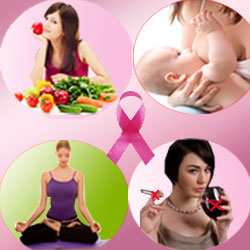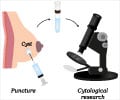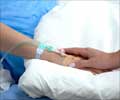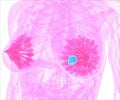How to Prevent Breast Cancer?
Cancer researchers opine that lifestyle choices are the main risk factors for breast cancer and by changing their lifestyle women can alter these modifiable risks. Following are the risk factors, confirmed by research studies that are affected by lifestyle choice.

- Age of childbearing – Researchers suggest that women who have no children or who have their first child after the age of 30 have a higher risk for breast cancer.
- Use of hormone replacement therapy (HRT) – A British study found that HRT is associated with increased risk of breast cancer and the effect is substantially greater for estrogen-progestagen combinations. Women aged 54 to 64 years and women who used HRT for ten year or more run the higher risk of getting breast cancer.
- Breast feeding – A large study on breast cancer and breast feeding found that the relative risk of breast cancer decreased by 4.3 percent for every 12 months of breastfeeding and the longer women breast feed the more they are protected against breast cancer.
- Alcohol - A collaborative reanalysis of data from 53 epidemiological studies suggests that four percent of the breast cancers in developed countries are attributable to alcohol but in developing countries where the alcohol consumption averaged only 0.4 g/day, alcohol has a negligible effect on the incidence of breast cancer.
- Obesity – A systematic review on obesity and breast cancer risk suggests that central obesity amongst pre-menopausal women may be associated with an increased risk of breast cancer. Fat spread out all over the body may not cause breast cancer.
- Physical activity – A case control study data reveals that lifetime physical activity is associated with decreased breast cancer risk. And recreational physical activity at ages 14-20 years is the most beneficial.
The following lifestyle changes can help lower your chances of getting breast cancer.
- Maintaining a healthy weight – According to an important study, women who prevented weight gain between the age of 18 years to menopause or those women who maintained weight from age 18 to 30 and then lost weight till menopause reduced their risk of postmenopausal breast cancer. So, get the scales out and keep a tab on your weight
- Eating healthy – Experts suggest that 20-80 percent of risk is linked to diet. Reduce the calorie and fat content of the dishes without compromising on the taste or cutting down on the serving size. Go for foods that are high in water content or absorb water as they cook (pasta, pulses, you get the idea). Consume fresh veggies and fruits
- Breastfeeding your baby – Give your baby the best start in life by breastfeeding them. Breast milk provides all the nutrition the baby needs. Breastfeeding not only boosts your baby’s immune system and protects them from infection, it also helps you lower your risk for breast cancer
- Being physically active – Being physically active will help lower your chances for developing breast cancer by eliminating the risk factors such as obesity, high estrogen levels. The American Cancer Society suggests that you exercise for 45 to 60 minutes 5 or more days a week. Further, physical activity can lower the risk of developing other serious health conditions such as heart disease, stroke, diabetes, dementia, and depression
- Limiting alcoholic drinks – Although modest consumption of alcohol may have a protective effect on heart disease, the World Cancer Research Fund (WCRF) recommends not drinking alcohol at all. If you do, then limit your intake to one a day. A recent U. S. research has cautioned against a single drink a day too. According to them, even a drink a day could double the risk of lobular type breast cancer but it didn’t increase the risk of ductal type breast cancer
These lifestyle changes can lower the risk for developing breast cancer; however, all these lifestyle changes are applicable even if you already have breast cancer. Along with the breast cancer treatment, some lifestyle choices can improve the quality of your life and help you cope with the disease.


















